Before he took on high profile books like Detective Comics and Wild Storm: Michael Cray, Bryan Hill caught my eye for his work of Postal, a series about a town of criminals and its unexpected saviors told in 27-ish issues. It featured writing that captures tough subjects, most notably Asperger’s Syndrome, with incredible nuance. It looks like he’ll do the same with American Carnage, a series from Vertigo about a mixed-race agent going undercover in a White Supremacy group and how it changes him.
I had a very engaging and insightful talk with Bryan. Read on for his thoughts about the end of Postal’s first volume (Warning: Spoilers Abound), his run on Detective Comics, and diving into subjects other writers are afraid to touch.
Are you working on any TV series right now? I know you wrote on Titans.
The writing portion of the show is done, so I’m not working on that actively at the moment. I’m still like looking at all [the footage] and aware of what’s being put together, but the actual writing of it is all done.
Where were you on a project back when it was still being made for TNT?
Noooo. That was years ago, probably before I even stepped into television. […] But I’m somewhat familiar with the biography of [its development].
It kinda reminds me of early Marvel when things were very up in the air, like how Runaways was originally being developed as a movie and it bounced around before finding a home on Hulu.
Yeah. The television landscape is ever changing. With streaming, you’ve got so many different platforms and those platforms have different needs and we’re figuring it out. It’s really cowboy land out here. Things that weren’t viable on one network for certain reasons suddenly become very viable on another platform, because that platform is [aimed at] a different demographic. So you have to be very fluid in this business. […] You have to more malleable because if you’re stuck on a really specific result you might not get there.
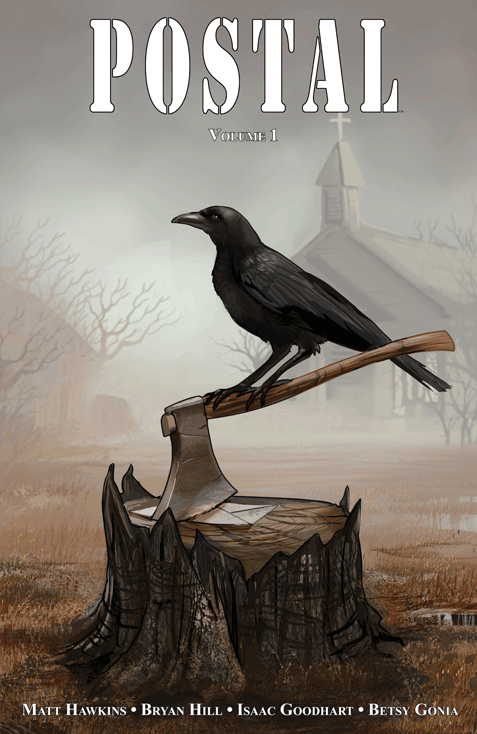
Matt Hawkins came up with the initial concept for Postal, correct?
Yes. I’d sold a screenplay and moved to Los Angeles. I was pretty fortunate because I was able to write a few more scripts and sold a pitch. So the screenwriting work was coming in. The movies weren’t getting made but I was selling scripts and able to sock away some money to make a decent life for myself. So I was in a weird place.
I’ve always wanted to write comic books. I was a fan of comics growing up and really wanting to be part of that industry. But there was no school for comic book writers, there was no pathway.
I’d met with Matt over lunch on occasions. I’d done some work for Top Cow before. I wrote a one-shot called 7 Days From Hell that was illustrated by Phil Noto, a short story in a Ron Marz Witchblade trade that I wrote with Ron, and a miniseries called Broken Trinity
Matt Hawkins and I would go get a cup of coffee sometimes, just to shoot the shit. I told him I really interested in getting back in the comics. I think Matt assumed that since I was screenwriting that I wouldn’t be anymore because the money you make in screenwriting is much better than the money you make in comics. But I really want to get involved in the medium. He told me he had this idea of a town where everyone in there is like a criminal, and the mailman is on the Asperger’s spectrum who’s sort of a town detective and the mayor is his mother. I said let me think about [the concept] so I could take it back to my home office and see what I came up with.
At the time I was really into Truman Capote and was reading a lot of Southern/Midwestern crime fiction. It just happened to hit at the same time this concept came my way. So I stream-of-consciousness wrote two pages about where the story could go, some of the character relationships. I added some details to Maggie and Laura. I sent that over to Matt and he liked it. He had a couple of things he wanted to accomplish specifically in the first couple trades. So I co-wrote the first two trades with him and with the third trade I took over and started writing solo. I would still [talk with him about the story] and he was aware of everything and very supportive.
You were kind of handed this protagonist with Asperger’s. Were you nervous writing a character who approaches the world very differently than you might?
No, not particularly, because I just delve research. I found a bunch of YouTubers that were also on the Asperger’s spectrum monologuing about what their lives were like. So I reached out and said hey, I’m working on the story and I want to be authentic and not turn your perspective, your experience into a gimmick.
I didn’t want Mark to be like a character from Monk, where he walks into a room and sniffs the air and tells you who killed the person. I wanted to avoid the “autism as superpower” cliche that existed in entertainment. But I also didn’t want [Mark] to be a fragile, precious character, like Raymond Babbitt from Rain Man. I think it’s a brilliant movie, but that articulation sort of dominated how we dealt with people on the polemics of the behavioral spectrum. Either they were eternal children or some kind of Mr. Magoo-like super detective that could smell a fart and tell you what you were thinking.
I didn’t want to do either of those things, I wanted to be authentic. So I spoke to a lot of those YouTubers, doing more listening than speaking so they could tell me their experience. What their days were like, what their thoughts were like, what the disconnect was between what they felt and how they were able to express emotion. They spoke about the difficulty they have understanding people’s emotions and the work they had to do to find a mode of behavior that can assist them in relating to other people.
I got some really great personal stories from that informed a lot of the character. I didn’t get into much textbook reading or psychological articles relating to [autism]. That stuff can be very cold and critical and that’s not the lifeblood of a character. You want the character to exist in three dimensions, so the best thing to do I could do in that situation is just talk to people similar to the character and, by osmosis, you absorb a lot of it.
I was really shocked that Postal didn’t end as a tragedy, with everyone dead and Eden in ashes. Did you and Matt always want to leave the series on a hopeful note?
Well, we never really spoke about how we were going to end that first season of Postal. When it comes to tragedy… I do enjoy tragedies. Hamlet is one of my favorite plays, I tend to gravitate towards work that may not have a happy ending. But I also felt that after 25 issues […] it wouldn’t have been of service to longtime readers to sort of end on a Red Wedding, as it were. People have been with the book for too long and with these small independent books, it’s not like an impulse buy like a Batman, Superman, Captain America, what have you, those automatic purchases.
When you have an original story you’re building the audience for those characters from the beginning and the readership you have is very close to the work you’re doing. I didn’t want to abuse people emotionally just because I could. I always considered Postal to be about legacies, a story about the generational handing down of power and the redemption of the parents through their children. It just seemed right […] to leave a little daylight in there. Letting Laura and Mark and Maggie escape some of the cyclical violence and trauma we’ve seen in the previous issues just makes sense to me for those characters.
As we look towards season two you have Mark in charge of the town and there is no Laura there for him to consult with. He’s left with the responsibility of running Eden with Maggie. In a lot of ways it’s about leadership, how would he run that town, similarly to Laura and also differently than Laura. Those [will] be some of the issues we address in the next chapter of the story.
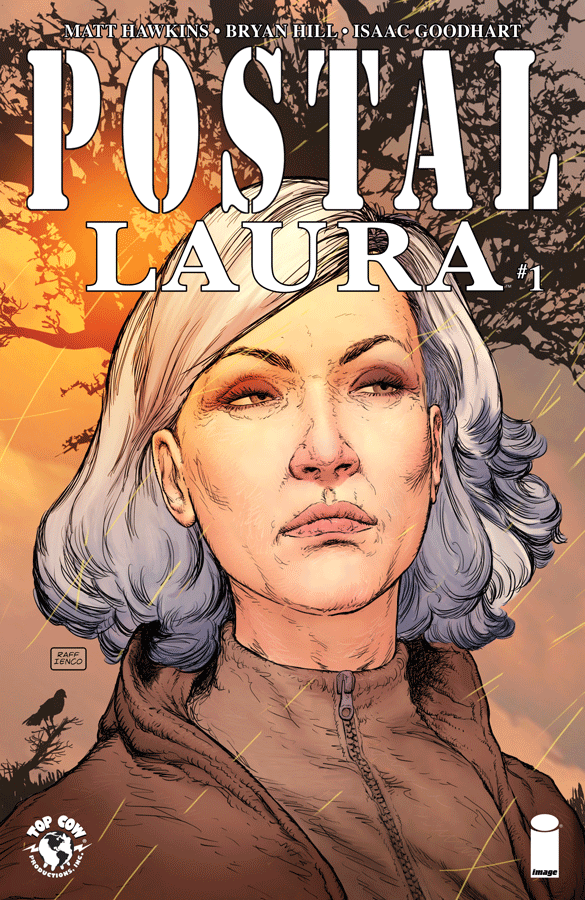
Laura is still alive, so should we expect her in the second season?
Well, I don’t think that sons can stay away from their mothers for too long. So I would expect Laura to be a factor in the next part of Postal for sure, although I’ll probably spend a little time with Laura outside of Eden to explore her character. [But] for people who follow the book and like those characters, they can expect all of the characters to be involved in the next iteration of Postal.
How involved are you in the Hulu series?
When I’m principal in an adaptation I keep abreast of everything that’s happening. In the case of Postal, I’m not. I never really wanted to be that involved in the adaptation of it because I said what I needed to say in the comic book itself. I felt like I would an obstacle for the people that were adapting it to another medium because I might be a little too close to it. I told Matt that if someone needs to consult with me and a question I’m certainly here. But I’ve adapted things and been through the other side of that process. Sometimes it’s best to [give the adapter the space to adapt]. So I’m not intimately familiar with its progress, but I hear good things.
Did writing Rowan (a white supremacist) in Postal inform how you’re approaching American Carnage?
A bit, yeah. The Rowan story was based on a person I really knew in Missouri who had been part of those movements.
Lot’s of times when you’re writing a story, there are things that you can’t really fit into the narrative so you put them in a journal and think about doing something else with those parts. Then the Charlottesville church shooting happened, and the world just seemed to be running off the rails […] so I took some of those notes and started doing more research into that world to [better understand it]. We all have an idea of what those movements were like in the 50s 60s, and 70s movements, but they’re much different now with factions with different ambitions and it’s [much more complex].
The Rowan kind of started me down that path and then current events kept me on the path. I did more research and talked to people in the movement that were still in the movement. There were some difficult conversations, but I got through them. I use all that to inform American Carnage.
American Carnage is a story about crime, it’s a story about identity, it’s a story about redemption. So there are certainly spiritual connections between it and Postal. I think that for fans of Postal, American Carnage will be something they very much enjoy.
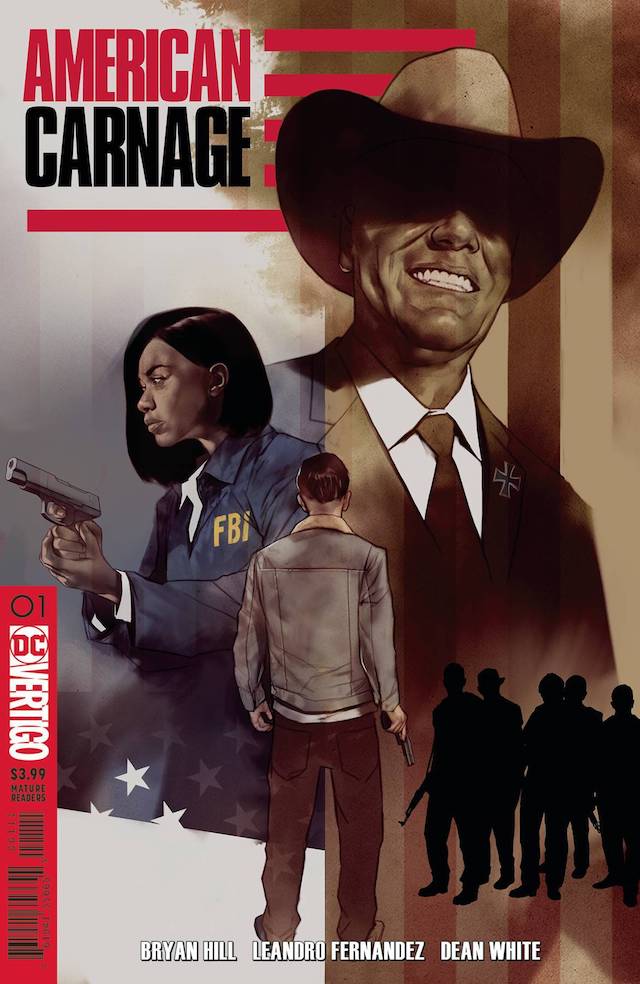
Rowan ultimately felt remorseful for his actions, but I imagine most of the white supremacists in American Carnage won’t. Do you think you can still make the characters sympathetic when, at the end of the day, they believe one race is superior to another?
Well, people are complex, people are full of hypocrisies, people can feel something about a group of people but have different feelings about individuals inside of those groups. One of the things I learned doing the research is there’s no monolithic belief system among those movements. And no matter how extreme a person’s belief system is they still have the same layers and depth and dimension that a real person does. American Carnage would not be interesting if it was just about a paladin going up against monsters, that’s not the story we’re telling.
The main character Richard starts to experience the vagaries and layers and hypocrisies and contradictions within people inside that movement and also inside of himself. None of the characters are rendered as cartoons, no one is fully bad or fully good. It’s a story about people who have made choices and the consequences that result from the choices they make.
Has Richard ever hid his ethnicity prior to the start of the series?
There’s a flashback in I think issue 3 a flashback when he’s speaking to his supervisor and talks about having to fit in. He can be the person he needs to be. That’s been his whole life, figuring out what makes other people comfortable and becoming that so that he can build a rapport and kind of get what he wants. That makes him a very good undercover agent because he can be a sort of a chameleon.
He hasn’t spent time hiding who he is, but he certainly tries to become whatever version of himself he believes the person in front of him wants to see, and that creates issues for him. It certainly creates complexities in his nature especially since doing undercover work is like being a professional liar. It’s very difficult to remember who you are. The story is, in a lot of ways, about Richard coming to terms with who he is with his ability to deceive and wondering if there’s anything left of him but the deception.
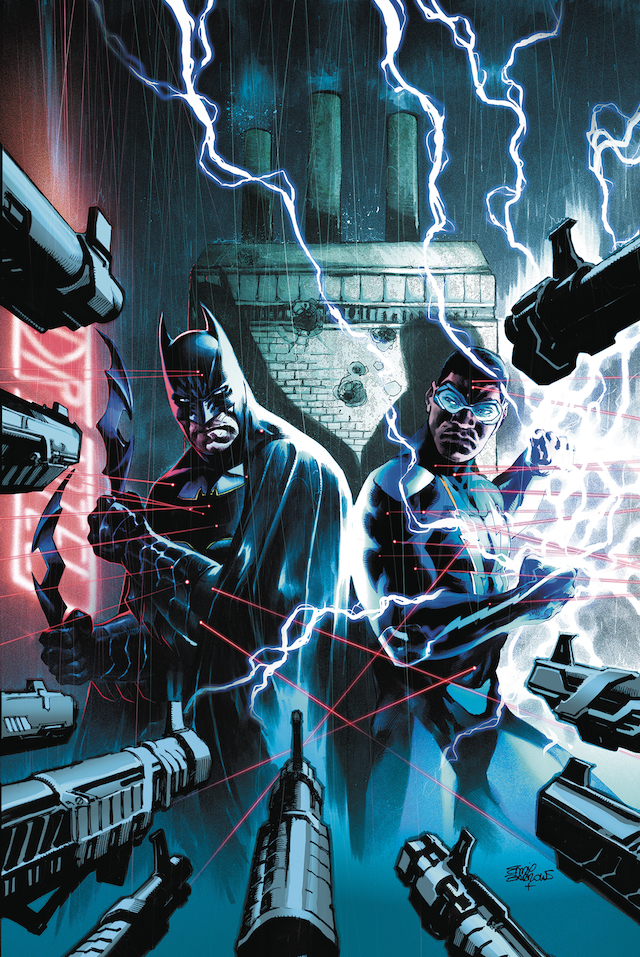
Did you always know your run on Detective Comics would be brief?
Yeah, when DC first approached me they told me [they wanted] a five-issue arc. I honestly didn’t think I would ever be approached to write Batman in any way. Batman’s like the Hamlet of comics, in that if you’re an actor you want to play Hamlet on stage once so you can show the world how you would perform “To Be Or Not To Be?” So I was happy to get the issues that I did.
How do you make it feel like Jefferson Pierce/Black Lightning really taught the kids something important in the short amount of time that he’s there?
I used to be an educator, I was a substitute teacher for a while, and then for a year, I was an adult educator. I worked with felons who had come out of prison and needed job skills to join the workforce, get on the right side of society and build a foundation underneath themselves. So I had some personal experience I applied
I didn’t want to tell a story in which Jefferson would come into Gotham and work with Batman and [have some magical insight] that made everyone better off. I wanted this to be the beginning of something, maybe the start of a path for the characters if writers want to come in and build on what I’ve laid down. I never considered a story where Jefferson acted like a genie who would resolve the turmoil felt by all those characters.
I do have moments where Jefferson leads by example, where he is able to kind of gather and harness [the younger Gotham heroes] around a cause. He’s also learning at the same time. He’s a teacher but also a student. Gotham works differently than most places and the characters in Gotham are different than residents of other cities. So there’s something for Jefferson to learn as well. I think they ultimately wind up teaching each other.
Can we expect you on another DC ongoing in the future?
It’s certainly possible. I can’t really say yes or no, but keep an eye out for what I’m doing and on social media. If something comes to fruition that will be the first place it shows up.
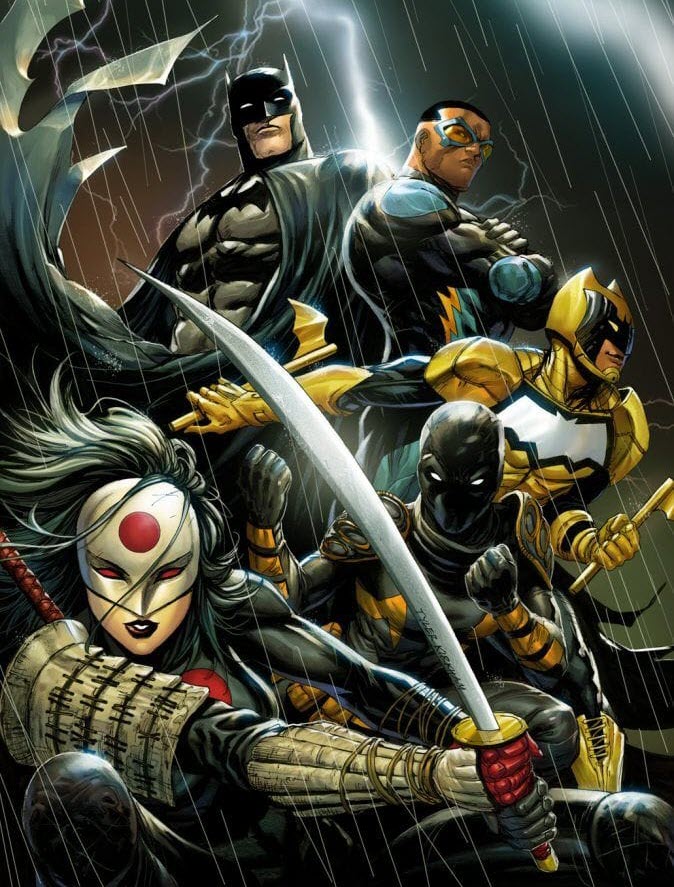
Guess what? Something came to fruition. Hill is writing Batman and the Outsiders, which picks up where his Detective run left off. Keep an eye out for that and (especially) American Carnage.
You can follow Bryan Hill on Twitter @bryanedwardhill. He also just started a series of videos about writing and being a writer that you can (and should) follow through his YouTube channel The Hill Administration.


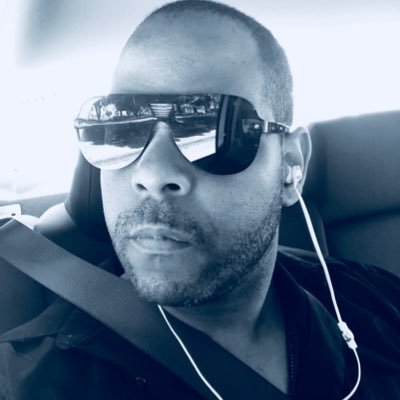
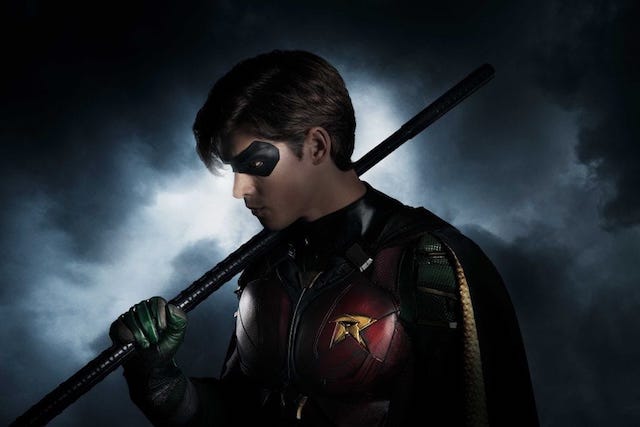
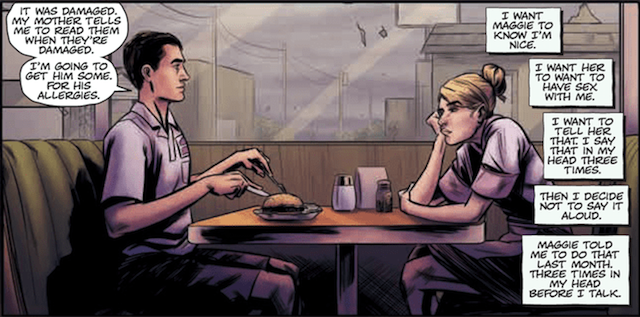



I’ll have to search some of this work out.
Comments are closed.